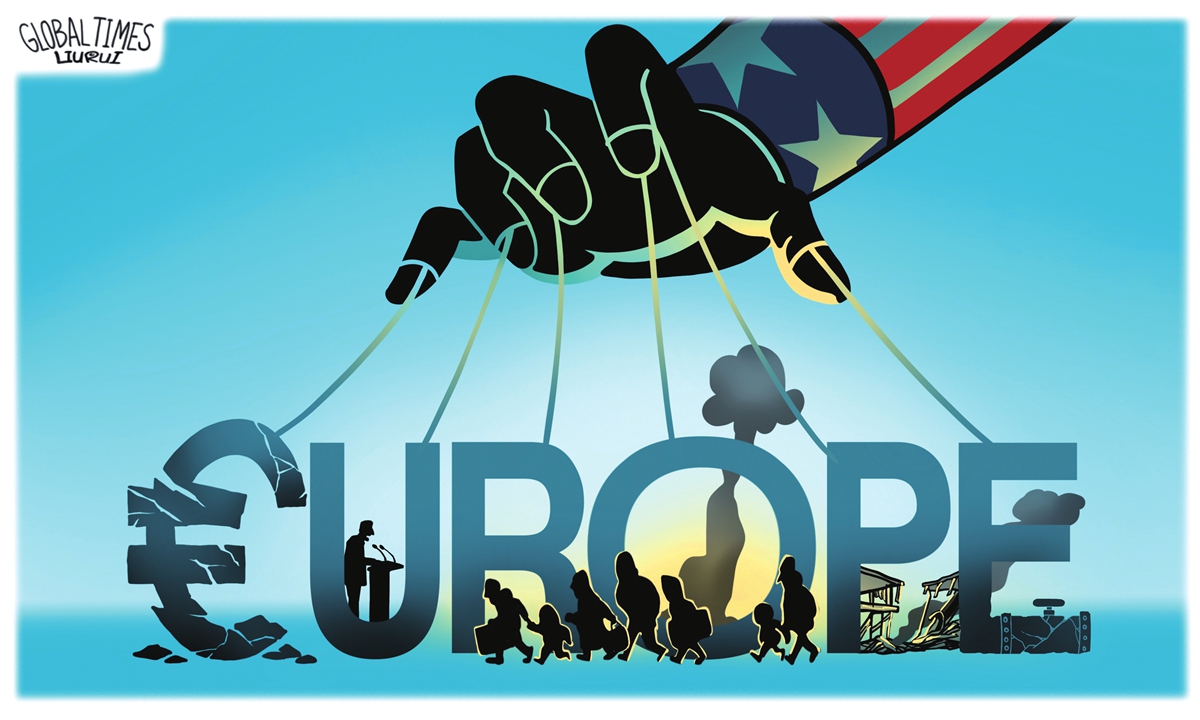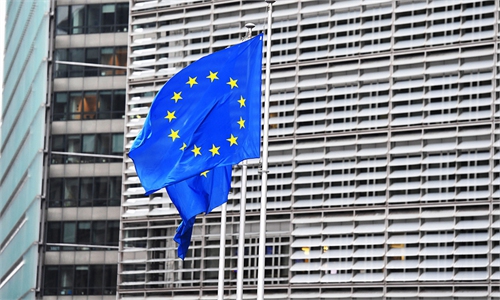
US' game of manipulation Illustration: Liu Rui/GT
As the Ukraine crisis escalated, the European Union (EU) had a moment of self-reflection. The EU High Representative for Foreign Affairs and Security Policy Josep Borrell admitted once that the West had made mistakes when building relations with Russia. But just two days later, when speaking at the Antalya Diplomacy Forum, Borrell claimed that "autonomy is not about the military. It means getting rid of dependencies."This shows that the EU still hasn't gone through a profound reflection. It did not learn the lessons from the European debt crisis or the ongoing Ukraine crisis. Fundamentally, Europe still hasn't gotten rid of its arrogance and prejudice, nor has it given due respect to Russia, the "loser" of the Cold War. Not to mention NATO, which continues to expand and squeeze Russia's security space under the instigation of the US military-industrial complex.
The EU should have thought about these questions: Would it and NATO have to face the current crisis if they had not ignored Russia's security concerns and recklessly absorbed Central and Eastern European countries into NATO? Would they urge an eastward expansion had they understood that the disintegration of the Soviet Union was not "the triumph of liberal democracy," nor "the end of history"?
The EU's reflection is more than just not thorough; it has gone astray. Behind this are institutional and civilizational reasons, as well as the US. If the EU truly believes that a lasting security system cannot be created against Russia, but only with Russia, it should not continue to follow the lead of the US. In that case, the Russia-Ukraine conflict could have been avoided in the first place.
Europe has been in constant wars after the Cold War, from Kosovo, Georgia, to Ukraine. European countries have followed the US to impose sanctions after sanctions against Russia, and even Switzerland, a country that claims to have the status of "perpetual neutrality," has followed suit. At a time like this, Europe needs to go through a systemic and institutional reflection.
In terms of Christianity, there are "three Europes": the Mediterranean Catholic Europe, the Germanic Protestant Europe, and the Slavic Orthodox Europe. Among them, the last one is obviously the closest to Russia.
Politically, there is an old Europe and a new Europe. Most of the Central and Eastern European EU members are from the former Soviet bloc, and most turn out to be hostile toward Russia.
Economically, the differences between European countries are greater, and their dependence on Russian energy is not at the same level. In conclusion, there are disparities across the European continent.
In addition, the EU should reflect more on the future world order. It should decide whether to return to the order of empires (or nation-states order) under Washington's hegemony, or join China and other emerging countries to promote a world order that is more in line with realities and future trends.
The EU should consider if sanctions are reasonable, legal, and purposeful. By following the US to impose more sanctions against Russia, European countries will only make their "systemic rival" a real enemy.
Some in Europe have realized that sanctions are unlikely to stop the conflict between Russia and Ukraine. The West's current sanctions against Russia are unprecedented, but not enough to force Russia to end its special military operation in Ukraine.
Since the EU has realized its mistakes in its relations with Russia, what it should do now is to immediately stop making more mistakes, as well as to start to reflect on how to deal with Russia and improve the current situation. It should think about how to handle China, another country that is "at war" with the West according to the US.
The author is Jean Monnet chair professor of the EU-initiated Jean Monnet Programme, and director of the Center for EU Studies at Renmin University of China. opinion@globaltimes.com.cn

